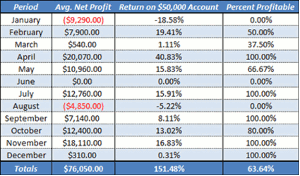As a business, trading has many advantages that include being your own boss, low startup costs, a flexible schedule and virtually unlimited income potential, writes Jean Folger of PowerZoneTrading.com.
Trading certainly offers the opportunity to have a thriving part-time or full-time business. The key to developing a successful trading business, or any type of business for that matter, is good planning.
Many people are lured into the trading business without knowing what the business really entails. Some prospective traders even begin live trading large positions without having developed any type of logical business or trading plan. Any business embarked on with such impulsiveness and lack of foresight is likely to fail.
Unfortunately, there is also lot of deception associated with learning the business of trading. A quick Internet search or the myriad late night infomercials will have you convinced that generating a huge income from the financial markets is easy. Or, that anyone with enough money to fund a trading account can double their money within a short amount of time. Here are some facts about the trading business:
- Most traders that begin a trading business (about 90%) fail within the first year.
- There is no such thing as easy money.
- There is no such thing as a trading system that has “zero risk.”
- There is no such thing a system that wins all of the time.
- Most successful independent traders are not “filthy rich,” but generate a comfortable income.
Trading is not for everyone, nor is it easy. It is a business that requires constant research, evaluation, and discipline. There are no guarantees or insurance with the trading business, and people who are considering trading should make sure they have both the personality and the financial means to take on this type of business activity. Some of the questions that you should ask yourself before pursuing a part-time or full-time independent trading business include:
- Am I driven to succeed?
- How do I handle losing?
- How well can I take criticism?
- Can I stick to a plan?
- Do I have the support of my family?
- How do I deal with stress?
Those traders who are able to weather the learning curve and the inevitable account draw-downs often go on to achieve considerable financial success. Trading is a business that is well suited for focused, responsible risk takers.
First, it is important to view trading as a part-time or full-time business, and not a hobby. As a hobby, trading would be frustrating and very expensive. Just dabbling in trading will keep traders from gaining the proficiency and experience needed to become consistently profitable. Although trading can be fun and exciting, it is still a business—one that can be very profitable and rewarding when approached from the proper perspective.
NEXT PAGE: Having a Business Plan Is Key to Success
|pagebreak|Profitable business owners seek to stay in business for the long haul and understand that get-rich-quick schemes often lead to failure. As a business, trading may not always provide a short-term profit. Winning trades are not considered net profit, since they have to be combined with trading losses and other expenses to develop the overall profit or loss of a trading business. It is the difference between the gross trading profit and expenses over time that creates the overall net profit (or loss) for the business. It is only over time that a business will develop a substantial profit, and successful traders have to take this long-term view.
Figure 1 shows a performance report for a trading plan broken down into months. Although this system showed a large loss during the first month and a net loss during two months during this time period, it managed to achieve an annual total net profit of $76,050.00. Statistics such as these help us develop a comprehensive business plan.
Figure 1: This performance report shows monthly profit and loss statistics for a trading system.
Developing a trading plan as part of an overall business plan may seem like a daunting task, especially to novice traders. Trading, however, offers a unique advantage that is not available to most other businesses: the ability to accurately test trading plans on historical market data, a process known as backtesting. Backtesting allows a simulation of a trading plan on past market data.
Imagine making plans to open a new store and projecting how much inventory you would need for the first year. Now imagine you have access to records showing exactly what items would have sold during the previous five years, had your store been open in the same location. Although this wouldn’t guarantee your store would sell the exact items again in the upcoming year, it would provide a realistic starting point for inventory projections. The historical records could also prove or disprove the viability of your business plan.
Developing a trading plan around historical testing can offer you the same type of valuable statistical information that will help in developing an overall strategic business plan. Using modern trading software and historic market data, we can accurately test the merits of a trading plan before we actually risk money trading it.
If you are considering becoming a part-time or full-time trader, there are some important challenges along the way. The first is developing realistic expectations for yourself, your business, and your ability to learn. This is not a profession at which you will become skilled overnight. Traders who push themselves into trading too soon or without a well-researched trading plan often find themselves back at the beginning, but with a lot less money in their accounts. Take the time to research and plan your business, as these are essential steps in your overall success as a trader.
This article is an excerpt from the book Make Money Trading: How to Build a Winning Trading Business by Jean Folger and Lee Leibfarth of PowerZoneTrading.com.











